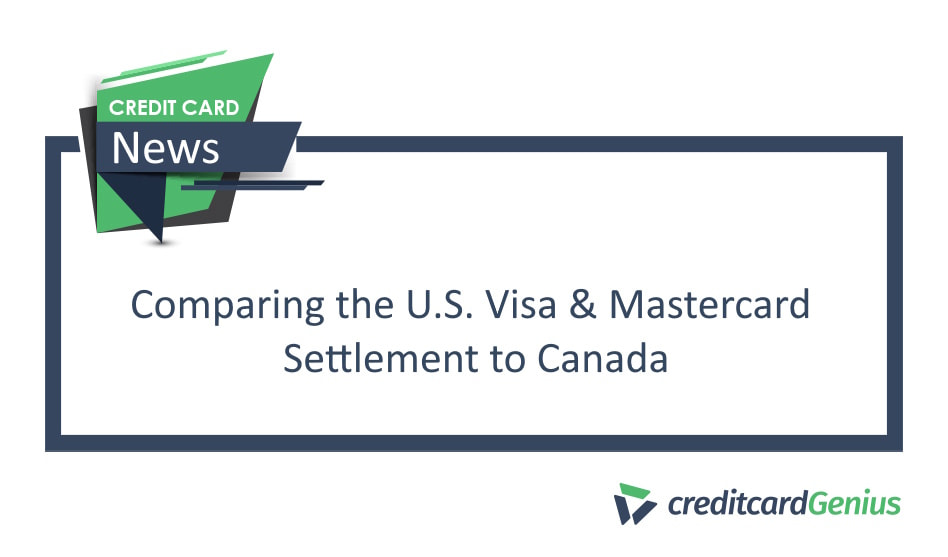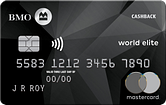There's been some big credit card news in the United States. A 20-year lawsuit between Visa, Mastercard, and merchants in the United States has reached a $38-billion settlement.
At the core of the lawsuit: what Visa and Mastercard charge merchants to use their credit cards.
This settlement won't have any direct impact on Canada – this purely affects the U.S. market, and Canada has already gone through our own version of this dispute.
But we're going to take this time to see what the U.S. settlement looks like and how it compares to the current Visa and Mastercard rules we have in Canada.
Never miss an amazing deal again + get our bonus 250+ page eBook for FREE. Join 50,000 other Canadians who receive our weekly newsletter – learn more.
What the U.S. settlement is about
The original lawsuit centred around one item – that Visa and Mastercard charge merchants too much for their credit cards.
The average fee for merchants to accept Visa and Mastercard in the United States averaged at 2.35% in 2024 (with a 2–2.5% range).
You may be wondering why American Express and Discover aren't part of this. It's simple – they only have one rate they charge for accepting credit cards. A merchant knows exactly what it's going to pay for using these cards.
The same can't be said for Visa or Mastercard. They have several tiers of their cards, and each tier comes with a different rate.
For Mastercards, these are World and World Elite Mastercards (with World Legend on its way). For Visa, the U.S. has Visa Signature and Visa Infinite cards. In short, since customers pay with a wide range of credit cards, merchants don't really know what they're paying for a fee until the final bill comes in.
What the settlement includes
As part of the settlement, some new rules are going to be introduced.
The biggest is the lowering of credit card swipe fees (also known as interchange fees). On average, they'll be lowered by 0.1% over the next five years. For standard cards, the fee will be capped at 1.25% for the next 8 years, which is a 25% reduction.
The lowest fee is an improvement, but simply lowering the overall rate to 2.25% may not seem like much.
But there are two more rules coming into place. Merchants will be able to:
- Add a consumer fee for paying with a credit card
- Reject premium Visa and Mastercards
Depending on the card, merchants will be able to add up to 3% on any transaction in exchange for a customer paying with their credit card.
A merchant doesn't have to take all Visa and Mastercards. They will be able to selectively choose which cards they take.
How this compares to the most recent rules in Canada
We have a few rules of our own here in Canada when it comes to Visa and Mastercard, and they aren’t completely unlike what will be taking place in the U.S. Of course, Amex is not part of this. While the government wasn't happy with the fees they charge, merchants know exactly what they pay with any Amex.
On average, the interchange fee is much lower here. The most recent change lowered it to 1.4%. Small businesses operating under certain amounts get an even lower rate of 0.95%.
Businesses are also allowed to add a fee for consumers paying with credit card. Merchants are allowed to charge either the cost of taking the card or 2.4%, whichever is lower.
In Canada, we don't have a rule stating that merchants can reject certain kinds of Visas and Mastercards. However, following this settlement, U.S. merchants will be permitted to reject cards with high fees, even if they accept other cards within the same payment network.
"Based on personal observations, I haven't really seen many merchants tack on a fee for taking credit cards," says creditcardGenius Sr. Financial Product Specialist, Jon MacLeod. “Sure, there is the odd one here and there, but it certainly isn't widespread. And since the new interchange fee was introduced, not much has changed when it comes to what credit cards are offering. There hasn't been a massive amount of credit card downgrades.”
But that's Canada – it's entirely possible the experience will be much different in the U.S. After all, the average fee will continue to be much higher down there than here.
And it’s important to note that the U.S. changes will be more restrictive than ours, with merchants being allowed to reject certain types of Visas and Mastercards. As credit card points optimizers, we do not want to see this rule come to Canada!
Stay up to date on credit card news
Want to stay up to date on all things credit cards? Subscribe to our newsletter and we'll let you know what's happening in the credit card world.
creditcardGenius is the only tool that compares 126+ features of 228 Canadian credit cards using math-based ratings and rankings that respond to your needs, instantly. Take our quiz and see which of Canada's 228 cards is for you.





 GC:
GC: 































Comments
Leave a comment
Required fields are marked with *. Your email address will not be published.